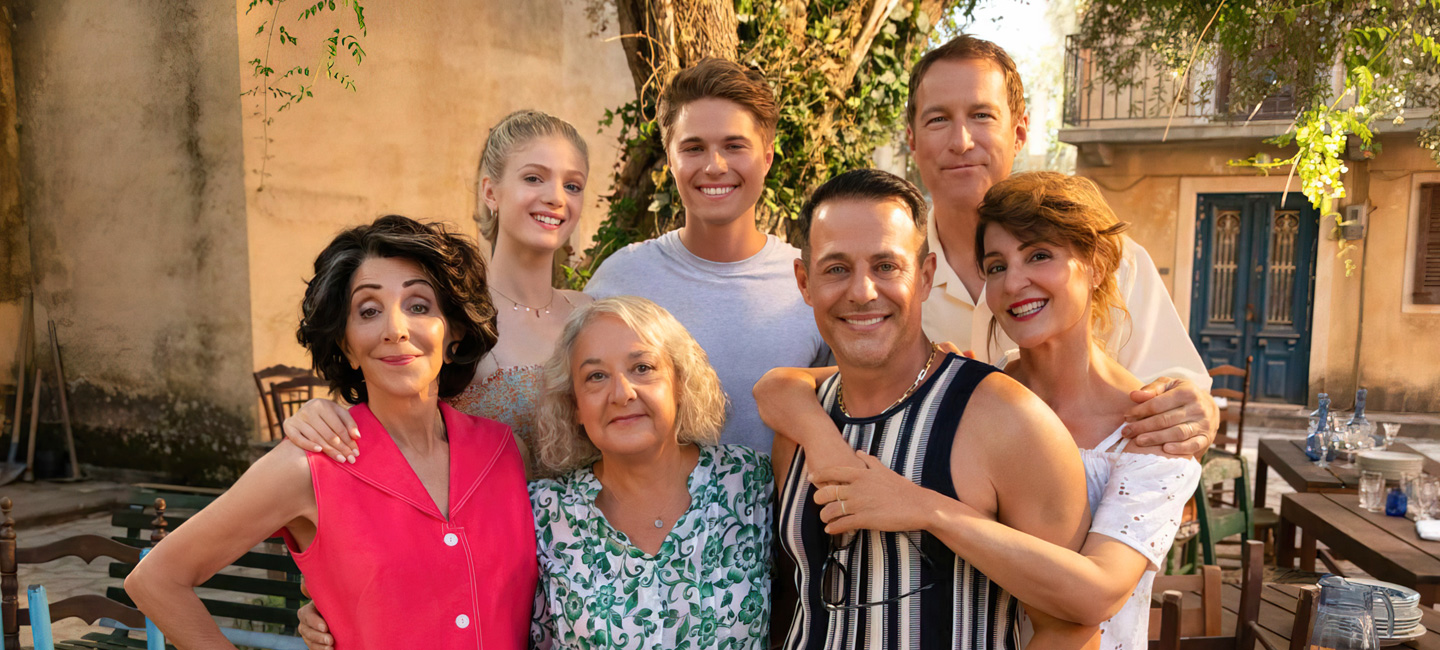Greeks. We’re easy to spot—our names all end in -opolopolous, our cars have symbols to ward off the evil eye and Tupperwares of souvlaki, and we flock to the theaters each time a new movie in the My Big Fat Greek Wedding franchise comes out. Over the last 20 years, Nia Vardalos’s hilariously relatable romantic comedies have charmed generations of Greek and non-Greek Americans alike.
The third installment in the series, released this September, sees the Portokalos family take their first trip back to Greece for a reunion of their father’s village, in the wake of patriarch Gus’s (Michael Constantine) passing. After being greeted by the mayor (and the family’s distant cousin), Victory (Melina Kotselou), the Portokalos find that the village is deserted—with a population of six—and that no one else has RSVP’d to the reunion. Toula (Nia Vardalos) spends her time in Greece trying to fulfill her father’s last wish, to return his journal to his best friends, while the rest of the family cooks, drinks, and uncovers long-held secrets. My Big Fat Greek Wedding 3 (2023) retains the charm and character that audiences know and love from the first two films, while diving deeper into the darker themes of grief and belonging.
Of course, with a new film comes new changes, the most significant being that the third film is directed by creator and screenwriter Nia Vardalos. This series is her brainchild—written about her own experience after her agent fired her, stating, “You’re not a visible minority … and there aren’t any Greek roles.” While that first screenplay was her tribute to the experience of Greek Americans, this third film seems to be a love letter to Greece itself, and her direction is gorgeous. The film captures Greece’s beauty beyond the tourist hotspots, in the historic villages and sweeping landscapes of the Greek countryside. It remains grounded in the smaller, more emotional interpersonal moments while maintaining its signature physical comedy. My Big Fat Greek Wedding 3 feels more saturated in love and sincerity than most of the rom-com adjacent films released in the last few years.
Michael Constantine passed away in August of 2021, but prior to his passing, he urged Vardalos to make the third movie without him. The film, dedicated in his honor, is as much a tribute to Constantine as it is to Greece, but still, his absence is palpable. Gus represented all of our pappous (grandfathers) and acted as the comedic cornerstone of the franchise, with bits that will be quoted for decades to come, like “Give me one word, any word, and I will show you how the root of that word is Greek” and “Put some Windex on it.” Constantine’s Gus balanced sentimental with silly while remaining grounded to reality, and the character contributed so much to the film’s cult-classic status.
This tribute is best illustrated as the Portokalos family argues over where to spread their father’s ashes, and who gets to make that decision. Ultimately, in a beautiful scene, three of the Portokalos siblings decide to spread his ashes together over the oldest olive tree in the village, where he used to sit and journal as a young child. The characters get the chance here to lay their father to rest in his home, but the actors and audience also get to make peace with Constantine’s passing through this serene display, a quiet moment amid the excitement of the wedding.
The entire series, spread out over two decades, excels because its themes and conflicts grow alongside the audience. People who watched Toula struggle for independence while they tackled young adulthood alongside her are returning, 20 years later, to see Toula coping with the fact that she and her siblings are now the heads of the house. Rather than remaining stuck within the confines of the rom-com genre of the first movie, the plot of each film strikes new ground based on the realistic daily conflicts faced throughout adulthood and throughout the changing social and political climate of both Greece and the U.S.
In the third film, we see Vardalos not only tackle the experience of Greeks in Greece but also portray the lives of recent immigrants to Greece from Syria and Ukraine. The big fat Greek wedding that wraps up the movie sees the marriage of Christos (Giannis Vasilottos), Toula’s nephew, and Qamar (Stephanie Nur), a Syrian immigrant staying with Alexandra (Anthi Andreopoulou). In a parallel to the first film, Christos’s father takes some time and conversation with Nick (Louis Mandylor) to come to terms with the fact that his son is in love with an exeno—the same term for foreigner that Gus used to describe Ian (John Corbett) before he married Toula. The family eventually comes around to support Christos and Qamar, and they celebrate with a gorgeous wedding of blended Syrian and Greek traditions and festivities. The wedding carries the heart of the first film into the third and has symbolic meaning, but could have had greater impact if Qamar and Christos’s relationship and character development had been given more screen time outside of the “he’s Greek and she’s Syrian” narrative.
My Big Fat Greek Wedding is an institution, especially to Greek families and immigrant households. The Wikipedia page for “Films about Greek-American culture” has just three movies: My Big Fat Greek Wedding (2002), My Big Fat Greek Wedding 2 (2016), and now, My Big Fat Greek Wedding 3. Whether this third installment was the closeout of the franchise or just another chapter, it provided audiences with plenty of laughs, a few tears, and ultimately, closure on Constantine’s passing, while bringing Greeks together once again to celebrate our culture (and the many antics of our big, fat, Greek families).







